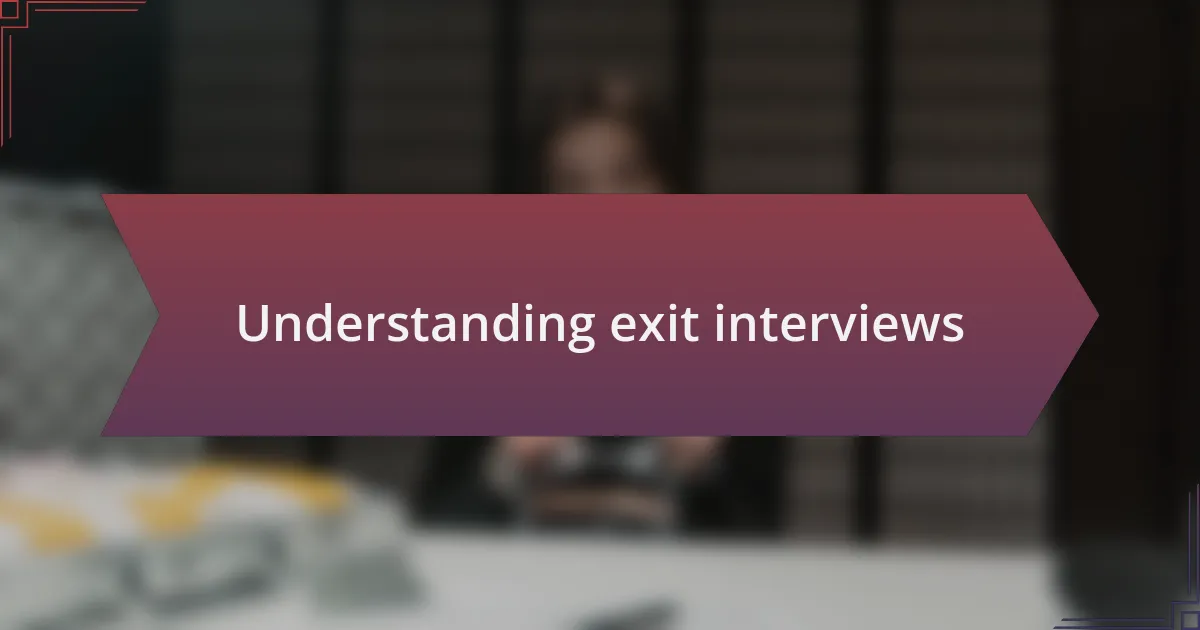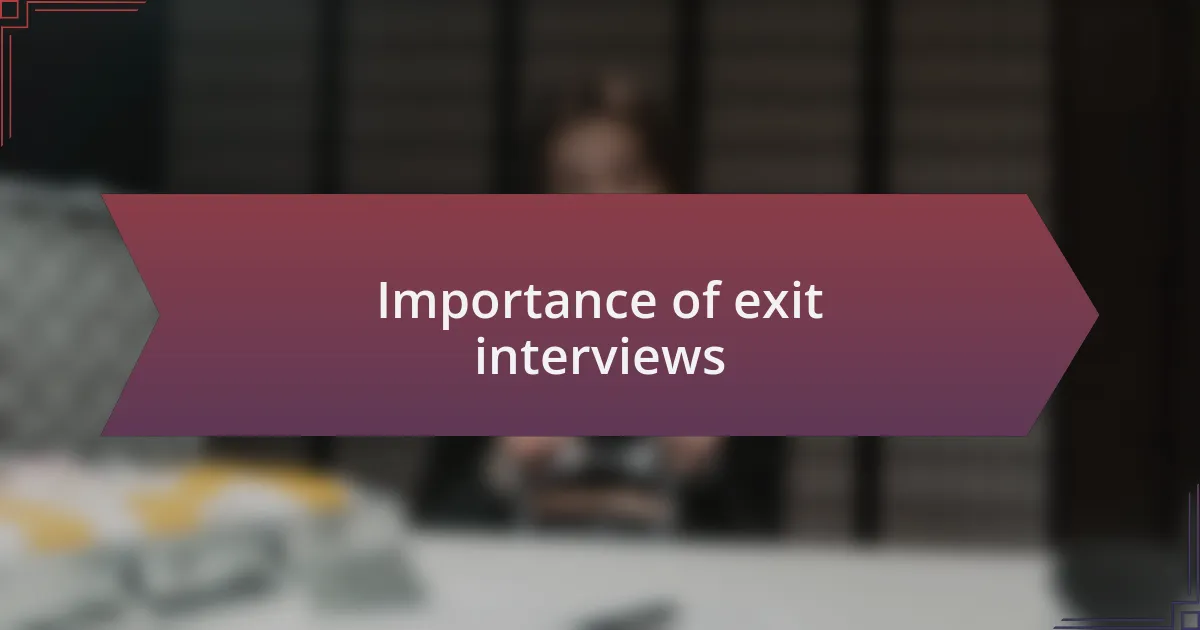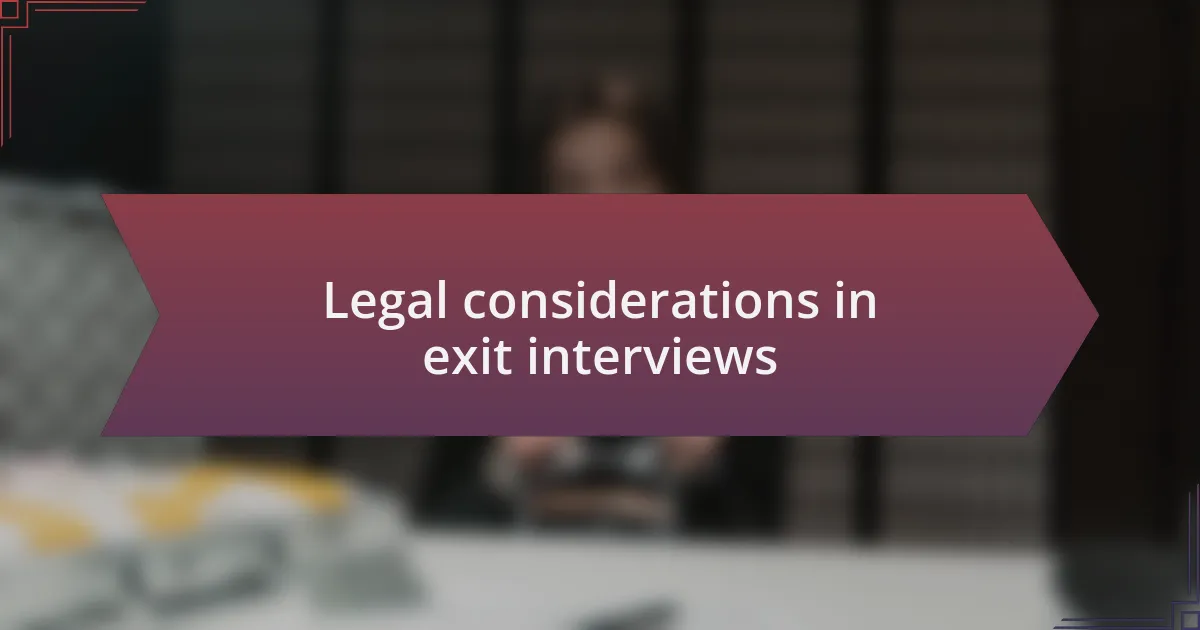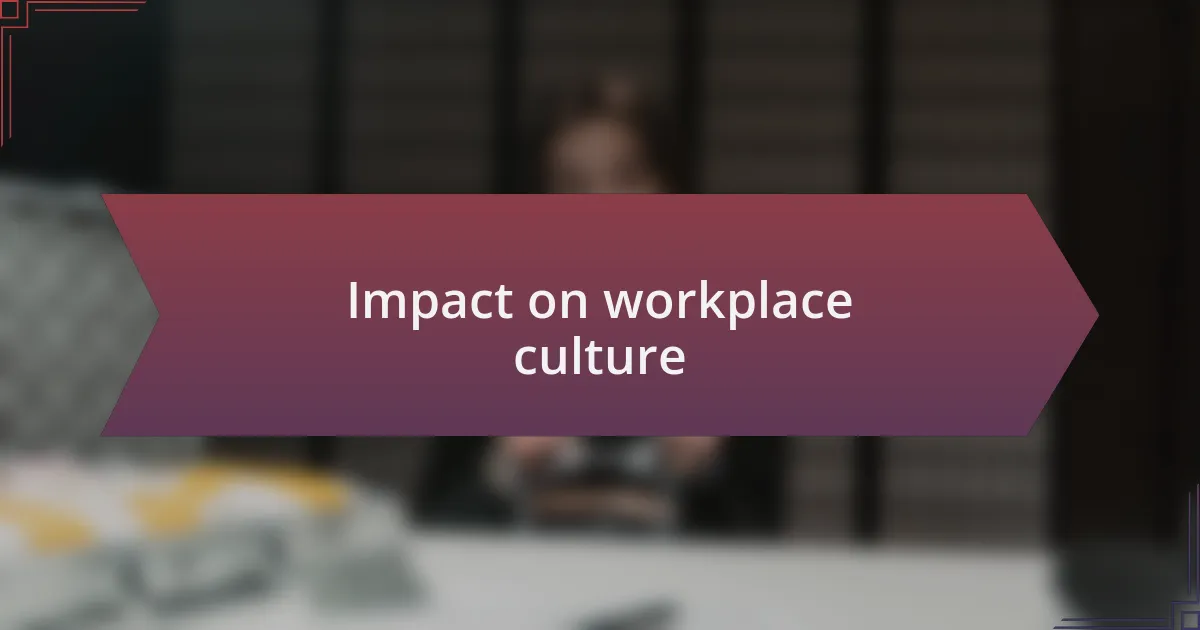Key takeaways:
- Exit interviews provide valuable insights into employee dissatisfaction and can reveal hidden issues affecting team dynamics and management styles.
- These interviews act as a crucial feedback loop, aiding organizations in improving processes such as onboarding and enhancing overall workplace culture.
- Legal considerations, such as confidentiality and adherence to labor laws, are essential when conducting exit interviews to prevent potential complications.
- Implementing changes based on exit interview feedback can strengthen workplace culture, increase employee morale, and foster a sense of belonging among staff.

Understanding exit interviews
Exit interviews are more than just a procedural formality; they offer a unique opportunity to gather candid feedback from employees who are leaving the organization. I remember my first experience conducting one; it felt like stepping into a treasure trove of insights waiting to be unearthed. These conversations often reveal underlying issues within the team dynamics or management styles that would be difficult to observe otherwise.
Have you ever wondered what employees truly think when they decide to leave? Many resignations come with unspoken frustrations, and exit interviews can bring those to light. A former colleague once shared how the lack of career development opportunities played a significant role in their decision to move on. Hearing that firsthand was a wake-up call that made me realize how crucial it is to address these areas proactively.
In my experience, the emotional tone during an exit interview can vary greatly, from relief to disappointment. One former employee shared that their exit was bittersweet; they loved their coworkers but felt stifled in their role. This blend of feelings not only highlights personal sentiments but also underscores the importance of listening with empathy. Are we doing enough to ensure our team feels valued while they’re still with us?

Importance of exit interviews
Understanding the importance of exit interviews is central to fostering a positive workplace culture. From my experience, these discussions can unveil critical information that sometimes gets lost in day-to-day operations. For example, I once interviewed an employee who left due to unclear job expectations. It was an eye-opener that highlighted the need for improved communication within our team.
Moreover, exit interviews serve as a vital feedback loop for organizations. I recall a situation in which the insights gathered helped us redesign our onboarding process significantly. It became evident that new hires felt overwhelmed; by addressing their concerns, we not only improved retention rates but also made a smoother transition for future employees. Isn’t it fascinating how one candid conversation can ripple out to create lasting positive change?
On a deeper level, these interviews can reveal the emotional landscape of your workplace. A former employee shared how their decision to leave was fueled by feeling undervalued; hearing this perspective shook me. It raised the question: are we doing enough to recognize and celebrate our team members before they feel the need to leave? In reflecting on these experiences, I believe that creating a culture of open dialogue could dramatically enhance employee satisfaction.

Legal considerations in exit interviews
When conducting exit interviews, it’s crucial to be aware of the legal implications surrounding what is said and documented. I once found myself in a situation where a departing employee’s feedback touched on potentially discriminatory practices. This experience underscored the need to handle information sensitively, ensuring that nothing shared could lead to legal challenges for the organization down the line. Have you considered how seemingly innocuous comments can escalate into serious legal matters?
Confidentiality is another significant legal consideration during these interviews. I remember a colleague who struggled with maintaining confidentiality when a former team member shared grievances about their supervisor. It became a delicate balancing act between valuing the employee’s honesty and protecting the organization’s legal interests. This taught me that establishing clear policies on information sharing can prevent misunderstandings and uphold trust.
Adherence to labor laws is paramount when conducting exit interviews. There was a time when I overlooked this aspect, and it resulted in complications regarding final paychecks and severance agreements. Ensuring compliance with state and federal labor regulations not only protects the employer but also fosters goodwill with exiting employees. Isn’t it better to leave a lasting positive impression, even as a team member departs?

Applying findings from exit interviews
In my experience, applying insights from exit interviews can fundamentally transform workplace culture. For instance, after a series of interviews, we discovered a pattern of dissatisfaction related to team dynamics. Acting on this, we introduced team-building activities, which not only improved morale but also reduced turnover. Have you ever considered how addressing these underlying issues can lead to a more cohesive work environment?
One key takeaway I’ve learned is to integrate this feedback into regular training and development programs. When employees voiced concerns about lacking career progression, I advocated for more structured mentorship opportunities. Implementing this change made a noticeable difference, creating a culture of growth and support. Isn’t it fascinating how a simple shift in focus can empower employees, making them feel valued and engaged?
Moreover, it’s vital to communicate these changes transparently to current staff. I made the mistake of not sharing the actions we took based on exit interview findings. When employees felt excluded from the conversation, it created an air of skepticism. By openly discussing improvements and how they stemmed from exiting employees’ feedback, we built trust and reinforced the idea that every voice matters—past or present. How do you typically ensure that current employees are aware of such initiatives?

Impact on workplace culture
Recognizing the impact of exit interviews on workplace culture has been eye-opening for me. In one instance, after interviewing a departing employee who had raised concerns about inclusivity, I realized how isolated some team members felt. This prompted me to spearhead an initiative focused on enhancing diversity training, fostering an environment where all voices are heard. Have you ever thought about how small changes can lead to a more welcoming atmosphere?
Through these experiences, I’ve also seen how exit interviews can bridge the gap between leadership and staff. For example, after learning that a former employee felt overworked and underappreciated, I initiated regular check-ins to ensure ongoing workload balance. This not only helped current employees feel supported, but it also demonstrated that leadership is genuinely invested in their well-being. Isn’t it interesting to see how open channels of communication can breed a sense of belonging?
In my journey, I’ve realized that a company’s culture is like a living organism; it thrives on feedback and adaptability. When we implemented changes based on suggested improvements in our exit interviews, the morale among remaining employees noticeably increased. I’ve witnessed firsthand how fostering a responsive culture can invigorate the entire team. How do you keep your workplace dynamic and responsive to change?